#magnus protocol analysis
Explore tagged Tumblr posts
Text
TMAGP Episode 39 thoughts and feelings

Spoilers below the cut
Luck between universes mentioned again? The first was in that doppelgänger episode, and then Sam saying he was cosmically unlucky. Now 3 people who certainly were not “luckier” in this reality. It makes me think that it’s really bad to have a universe with some sort of eldritch cosmic balance connected to the (allegedly) Eyepocalypse universe.
That really brings into focus some of the parallel statements/occurrences between Archives and Protocol (man eats computer / computer eats man being an obvious one)
MY GOODNESS every part of the setup of this episode is interpersonally messed up and I LOVED IT. I’m super interested in the implications of Sam having appendicitis at the same time as this universe’s Sam, as well as the Eye-dream-like connection that people in the same domain can have.
Wait, hang on. Domains? Is Fr3-D1 some sort of human-assisted domain name server, converting niche eldritch fears into computer-eatable code? That would tie into Celia’s comment ages ago about not knowing if they’d ever repeated the same code twice. (Or do I, a pokemon fan, just have the phrase DNS Exploit permanently tattooed in my brain?)
The Statement
Why did they not realize this was a statement at the time? It’s plausibly explainable but feels really overly plot convenient to me.
This statement made me feel SO MANY THINGS. The intro is so visceral, then the reveal that this is Alice trapped inside of herself makes it come together so well AGH—I am trapped within myself and no matter what I do I will never escape this living tomb—i need to sit down for a sec.
MORE SAM BONES MORE SAM BONES
The melting pot of self hatred and putting yourself through hell (literal) in order to feel any sort of closeness to someone you’ve lost is such a tragic sort of self endangerment. And to go from that straight to PL Alice pleading with Sam and Georgie to stay just hurts. Anyways this one was really good.
Loving someone in their absence as grief… surely there’s no thematic implications in that line…
Fully unrelated, I am going through Tim Fearon withdrawals. Why is Augustus not here this season? Is it connected to the multiverse shenanigans? Or to the damage Colin did to Fr3-d1? (his statements were tailing off throughout season 1 too… much to ponder.) Hopefully he can be dreadful in our eardrums again soon.
21 notes
·
View notes
Text
another big difference between tma and tmagp is that in tma, the listener is essentially on the same page as jon at all times. you know what he knows, and when he discovers something new, he immediately tells you. but in tmagp, everyone already knows more than you. and they won't tell you. you just have to try to listen in at the right time.
it's kind of tied to tape recorders; in tma, your existence as the listener is justified. it has a purpose. you are the tape recorder. that's why you get to know everything. in tmagp, you're not supposed to be listening. what you get is scattered, contextless scenes, starring people who don't know that you're listening.
and i fucking love that.
4K notes
·
View notes
Text
ALICE: So each of the cases is categorized on four metrics with a standard integer scale, that’s your DPHW.
GWEN: Okay. Now I’m pretty sure I need to try and keep them as even as possible.
ALICE: Ok, so, it makes sense that if you’re low on “W” that means we should probably prioritize processing cases with a higher rank on that metric to bring the average up, right? … So, it’s just a hunch but I bet if we have a look at old cases and then try and sort by “W” we can find out which cases got the biggest scores in that metric and reverse engineer what you need … Now, unless I’m wrong, which, let’s be honest, is pretty damn likely, when we cross reference this shortlist for common terms we’ll find out what Freddy thinks you need and that... is... more... Bonzo?
Loving finally getting a breakdown for why DPHW is important, here.
Now I, like the utter nerd I am, have been tracking the DPHW of each case on a spreadsheet, and therefore was able to do some quick sorting just like Alice. Bonzo is definitely our highest W scorer of the lot – he’s got 2 of the 5 cases ranked as “8” on that metric, though he tends to score pretty high on P and H as well.
However.
We are not low on W. When you add up the total DPWHs of every case we’ve gotten so far, you get:
D – 136 (average score 3.2)
P – 148 (average score 3.5)
H – 210 (average score 5.0)
W – 218 (average score 5.2)
W is the highest metric. So either it needs to be the highest, and the balance only works if it’s at the top...
…Or Freddie is lying about what’s needed, and intentionally trying to send things haywire.
Not too much mercury or the world ends, not too much sulfur or we all go mad…
#also fun to note that the dphw for colin getting eaten was 5555#completely balanced#(the crowbar threw it off though)#the magnus protocol#tmagp spoilers#36 outside the box#my magnus protocol stuff#original post#queue cause i'll be at work when the episode airs#fr3-d1 | freddie#magnus protocol speculation/analysis#if we really want to balance things we need more violins#or just to turn people into trees#push d up a little#though again both of those are pretty high on h as well
483 notes
·
View notes
Text
TMAGP 31 - A Computer Nerd’s Breakdown Of The Error Logs
It’s round 3, bitches! (tumblr crashed twice when I was writing this so I’ve had to start again multiple times. I do in fact see the irony, considering the subject matter)
I was listening to TMAGP 31 and as a computer nerd, oh my god those error messages just HIT DIFFERENT. There are so many subtle details hiding in those lines that a typical non-computery person would probably miss, so I feel it is my duty to explain them and their possible implications. So that’s why I’ve decided to fully break down each part of the error report, complete with what they could potentially suggest — think of this as “the TMAGP theorist’s guide to deciphering Chester’s yapping”
So without further ado, let’s get this party started…
(NOTE: lines from the transcript are in red, ‘translations’ are in purple, jmj specific stuff is is green, explanations are in black)

Starting off with Category: fatal programmer error, notice it says programmer, not program. There is nothing wrong with the code - the user has truly fucked up. Uh oh, Colin has made a big mistake…
Also, clever double meaning here with the word fatal. Obviously we know it was fatal to Colin (RIP king 🥲), but error logs also typically have a criticality level describing if immediate action needs to be taken. There are 6 commonly used levels, with the most critical being, yep you guessed it, ‘fatal’ - this means that whatever Colin was doing was a critical threat to the system. In other words, Colin had figured out the problem and was dangerously close to fixing it so Freddie just went “oh shit, we need to deal with this guy quickly or we are in serious trouble.”
Then we’ve got the next line, attempted host compromise (the Errno611 isn’t significant - error codes vary from system to system). When it comes to network terminology, a host is basically just any device on the network, so in full this line basically means “somebody’s tried to damage part of the network.” Importantly, “host” seems to suggest that the computers aren’t the source of this evil but merely a vessel for it. Freddie is just the mouthpiece for these supernatural forces - a bit like a non-sentient (as far as we know…) avatar. Whatever these forces are, they didn’t come from within/they weren’t created by Freddie.
(NOTE: I will come back to jmj=null in a bit)
The program traceback, Traceback <module> by extension BECHER, is rather interesting. A network extension is a way of providing network access to remote users (think along the lines of a VPN) by creating a personal direct ‘route’ to the network. Therefore if it’s the subject of an error report, it means there’s been an issue with data transmission along that path. So this bit means “there’s a problem with this specific network route that’s allocated to Colin.” However, the darker implication here is that Colin is an extension of Freddie. Although he wasn’t initially a part of all of this, he’s become tangled in the web (no pun intended) to the point that he and Freddie are inseparably intertwined. The OIAR employees may be able to quit their jobs, but they’ll still be a part of Freddie…

There isn’t much to say about Host=self.host in this context. It’s just convention when it comes to object oriented programming. Not important here.
Extension BECHER compromised isn’t just saying “there’s an issue here.” It’s saying “there’s an issue here that is a serious threat to network operation.” In other words, Freddie’s going “uh oh. Colin needs to be dealt with.”
The next bit is pretty self explanatory. I really don’t think I need to explain what <hardware damage_crowbar> means for you guys to understand. This bit made me laugh so hard. One thing that’s interesting though is that it gave it a DPHW, so Freddie processed this like it was an incident… Perhaps this fully confirms that the ‘thing’ controlling Freddie is of the same origin as the cases - it’s not something else entirely?
And now onto Administrator privilege revoked. This was the moment when I fully realised “oh no. Colin is fucked,” because any control that Colin may have had over the situation is now gone for good. Freddie’s basically just said “fuck you Colin. You’re not in charge anymore. I am.”

As you can probably guess, Unexpected data isolated/resolved just means that the crowbar’s been dealt with and the program can run as usual. Similarly, the Colin threat is fixed now he’s not an administrator i.e. he can no longer control the system. However, it then gets weird with Independent operation permissions revoked… It’s not saying Colin can’t use the network independently, it’s saying that Colin can’t be used independently of the network. Remember what I was saying earlier about Colin being a part of Freddie? Yeah, well now he purely is a part of Freddie. They’re turning our boy into data!

NOTE: I know in the audio it said everything was discarded but I’m going by the transcript. Idk why they’re different
You know it’s a bad sign when you hear Re config: self.host - Freddie’s evolving. The network is literally reconfiguring itself to now include Colin. And then Freddie goes through each of his alchemical elements one by one and fucking deletes them! How rude. You go and eat this man only to spit everything out!? I guess he’s feeling generous though, because he decides to keep the sulphur, which in alchemy, refers to the soul… If this isn’t just a coincidence, then that means Colin’s actual soul has been uploaded to Freddie. That could be really cool. And messed up. But mostly cool.

Starting with the final line, everyone knows what New administrator permissions assigned means, but we don’t know yet who they’ve been assigned to. Maybe it’s Gwen? Maybe it’s a new character? Maybe there is no system administrator anymore? It’s a mystery.
Now that’s out the way, let’s get on to the real juicy stuff…
The top few lines are pretty simple - it’s Freddie’s way of saying “Colin was a problem. We ate him. Now he’s not a problem anymore.” The next line, however, is a reminder that none of this is simple” - .jmj error not resolved. There it is again. The infamous jmj error. What does it mean? Jon? Martin? Jonah? Is that you???? Nobody knows. One thing we do know though is that jmj=null (from the start of the error log). Now when it comes to interpreting values, null is weird. It’s not zero, it’s not empty, it’s sort of nothing but it’s not nothing. It’s just null. It means no value, but it doesn’t mean that the variable doesn’t have a value (if that makes any sense to you guys???). Ooh I think I know how to explain it?? Imagine you’re Jonathan Sims, head archivist of the Magnus Institute and you’re digitising some archived ID photos when you find one without a name. The recorded name in the database would be null - you can’t put anything in particular, but that doesn’t mean the person in the photo doesn’t have a name. I guess null means unknown or missing here. So basically, what jmj=null means is that the jmj is unknown and that is a problem because it can’t get ignored/it is important. So what it’s basically saying is that jmj is a mystery not only to us, but also to Freddie.
Take a look at Data integration cycle ongoing <0.02%> - Data integration is the process of combining data from multiple sources into a single source of truth. There are 4 stages: data ingestion, cleaning, transformation, and unification. Thanks to the whole Colin ordeal, I’m sure you are all quite familiar with these stages by now (and that, students, is what we call a case study!). The peculiar thing here though is that we’ve just witnessed most of the data integration cycle - surely it should be higher than 0.02%? Yes, that’s correct. It should be far higher than that. It makes no sense. UNLESS this isn’t about Colin. Most of Colin’s data has probably already integrated. This is something else entirely - something so much bigger and foreign than these computers were designed for (the only comparison I can think of is trying to run the sims 4 with all expansion packs on a 15 year old laptop. It really shouldn’t work, and it probably won’t, but it’s gonna try regardless). This seems to follow on nicely from the jmj=null comments above, because Freddie is clearly struggling to integrate something (hence System function margins down to 82%), and when you try to read data that hasn’t been fully integrated with the system, you end up with a lot of missing & unknown values. Sound familiar? Yep, that’s right - until more data is synchronised, many values will be null, like our good friend jmj. Why is it taking so long to integrate jmj? We don’t know. Perhaps its origins are so supernatural and otherworldly that it’s simply not tangible enough for Freddie to process it? That’s what I think at the moment, at least.
So yeah, that’s my line by line analysis done! Hope you found that helpful/interesting. This podcast is so well written I’m actually going insane! Jonny and Alex, you are the guys of all time! As I’ve already said, feel free to expand on any of this - I’d love to hear your theories
Signed, your friendly neighbourhood computer nerd who is very autistic about TMAGP :)
#tmagp#tmagp 31#tmagp spoilers#the magnus protocol#tmagp analysis#tmagp season 2#fr3 d1#I’m so excited for the rest of season 2!!!!#here is my detailed guide to the errors in tmagp 31#as promised#call me Tessa winters the way I infodump about computer science to the Magnus archives#using my autism for the good#i really enjoyed writing this one#I hope you enjoyed reading it too#my random musings#my ramblings#I’m not apologising for the long post#i spent way too long on this#my post#colin becher#chester tmagp
312 notes
·
View notes
Text
wait wait wait we've seen this before. we've seen someone ignore the fears so hard that she survived a ritual. sure, alice is flippant like tim, but the way she just ignores and compartmentalizes the horrible things she's forced to witness is so much like basira.
#their personalities don't align much otherwise (as far as we know) but still!! think about it!!#basira (anti)logic-ed and ignored her way out of the unknowing!#tmagp#tmagp analysis#the magnus protocol#tma#alice dyer#tim stoker#basira hussain#bs.txt
1K notes
·
View notes
Text



I can’t stop thinking about this. I can’t.
The way Jon has become exactly what he wanted so desperately to avoid — a mystery. He was once the one investigating The Magnus Institute and all its mysteries, but now he’s just become another Gertrude, part of a new puzzle to be solved by someone else.
“I was wondering if you knew who Jon was?” And we know, of course we know. How could we ever forget the man we grew to understand and care for? But they don’t. Sam doesn’t. This Jon is just another mysterious name in another mysterious job.
And that’s what would matter to Jon.
#tmagp#the magnus protocol#tmagp spoilers#tmagp 22#TMA#tma spoilers#jonathan sims#the archivist#TMA analysis
617 notes
·
View notes
Text
thinking about the door imagery in the magnus archives– the threshold metaphors if you will.
jane prentiss and her worm doorway, the door in jon's mind keeping the ocean of knowledge at bay, obviously helen and michael and the distortion itself manifesting as physical doors, and of course the final incantation of "i open the door" to unleash the apocalypse
the use of the physical idea of a door to give a visual for the lines that are crossed in tma is so fascinating to me as a concept, bc as a zillennial one of the lines that lives rent free in my head since 2011 is from doctor who - "a doorway, once opened can be stepped through in either direction"
and this leads me to the literal door ways to parallel worlds in the magnus protocol and god if i had more brain power and time to do a full relisten to further Think about this
#does he know about the d o r e ?#the what?#THE DOOR#tma#tma analysis#the magnus archives#jonathan sims#helen distortion#michael distortion#tmagp#the magnus protocol
130 notes
·
View notes
Text
I do think the most likely scenario is that alice at least partly blames celia for what happened to sam, but could you imagine how much it would suck for celia if she didn't blame her at all? if she comforted her and assured her that is 100% is Not her fault.
sam is always like this. always sticking his nose in places. he should've listened to alice. he should've waited so they could all go together like they'd agreed. celia did her best to keep him safe by joining him after she couldn't stop him. it's not her fault he chose not to look at alice's messages, she didn't know the archivist was following them! she did her best! it's not her fault sam insists on throwing himself bodily at threats, he's chivalrous like that. it's not her fault.
she tried to keep him safe. she did all she could. alice isn't going to blame her.
she knows she would never mean to hurt him
#ramblings with major#the magnus protocol#tmagp#tmagp spoilers#sorry i keep injecting my analysis and theories with dramatic flair it will happen again
266 notes
·
View notes
Text
Sam fumbled Gwen’s Bonzo reveal… but he’d been primed to do so
I suspect that there's going to be a LOT of conversation around Sam after this episode, and since this episode was so good that I couldn't think of a meme or shitpost, I decided I'd throw my hat into the ring and do some character analysis instead. CW: Spoilers for The Magnus Protocol episode 18, "Solo Work" under the cut.
Episode 18 finally gave us the Sam and Gwen interaction I (and I think a lot of others) have been so desperate to finally see, and boy oh boy do I have Thoughts… none of which are new per se, but Sam’s reaction to Gwen dropping the Bonzo Bomb seems to have reinforced the way I’ve been reading (and projecting in fanfiction oops) Sam, his personality, and his motivations.
Out of everyone new we’ve been introduced to so far, Sam has by far gotten the most explicit development and conversation around his personality. Even before episode 1, folks who participated in the ARG got a preview of our favorite baby shrimp’s personality through access to the child database spreadsheet that was, presumably, used to document the results of the experiments run on children participating in The Magnus Institute’s “gifted and talented program.” From this spreadsheet, we can gather that Baby Sam is logical, empathetic, works towards the benefit of others (prosocial), and fair… but also a rule follower and highly willing to follow the lead of an authority figure, even if it is in conflict with his personal views. The picture this information paints is an interesting one, but when taken in a vacuum leaves us with an impression of Sam as someone who is kind but lacking in backbone.
This idea of Sam as “kind but lacking in backbone” is further reinforced in canon, as Alice of multiple occasions rags on him for being “noodly” and “ickle fawn” and a “baby shrimp,” all seeming to highlight that Sam has the sort of helplessness about him typically ascribed to sopping wet kittens and baby birds. And I think that if we view Sam’s outburst when Gwen brings up Bonzo through this lens alone, it’s going to seem WAY out of character for him and a downright cruel response.
Now while I do believe that Sam is empathetic and fair and, sometimes, a little helpless, I’ve been inclined to believe from early on that much of Sam’s affable self-deprecation is a way to cover or soften what can be, at times, a tendency to be hard-headed, temperamental, a little manipulative, and petty (and I’m totally not just saying that as a people-pleaser-and-gifted-kid-in-recovery who has been projecting hard on Sam since Day 1). And it’s this second batch of personality traits, the ones that make Sam so real and interesting to me, that I think set up the disaster of a conversation between Sam and Gwen.
We have definitely seen hints of Sam’s hard-headedness and manipulative leanings in previous episodes: it comes out most often around Alice, showing his stubbornness in the form of refusing to give up his lines of questioning and curiosity about what is happening in the cases and at the OIAR; and revealing his willingness to manipulate a situation the form of subtly redirecting Alice’s focus away from prying into his crush on Celia and during the mocha incident (I have, of course, already explored Sam’s manipulative tendencies in my totally comprehensive shitpost).
And we’ve even been shown at times before episode 18 where Sam can be petty, his buzzed insistence that Alice try and keep things “professional” at work after his date with Celia being at the top of the list. The case headers filed for “Putting Down Roots” and “Pet Project” also suggest to me Sam’s ability to be stubborn and petty: in both instances, Alice and Gwen suggest a different classification than the one that Sam ultimately files. In the case of Gwen in “Pet Project,” she’s dismissive of him when he tries to ask if she’s all right.
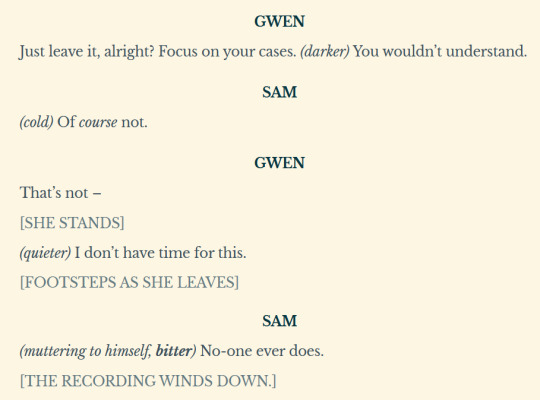
While there’s no way to know for sure, I interpret this interaction as part of the reason why Sam ultimately disregarded Gwen’s suggestion for how to file the case—she shut him down and shut him out, and the petty part of his heart couldn’t resist ignoring her recommendation out of spite. This scene also begins to lay the foundations for Sam and Gwen’s interactions in episode 18 and, I suspect, the rest of the season.
So with all of this in mind, let’s look at episode 18. When Gwen emerges from Lena’s office, Alice has just finished shutting Sam down, again. Throughout most of this season, Sam has been desperate for some validation that the cases they are listening to are real, that whatever happened to him at The Magnus Institute was real, and that him pursuing this line of questioning and wanting to find answers isn’t a waste of his time. Alice has, of course, been not-so-gently nudging him away from this line of thinking for most of the season, while Gwen has been icing him out about it up until this point. Just about the only one who has given his questioning any air has been Celia who is, conveniently, not there. Even after Alice has her very own supernatural experience that is reaffirmed in the case Sam receives, she strongly pushes back on his idea that they should investigate and pursue this further. He understands why she doesn’t want to learn more, but it’s clear that he’s still frustrated at the end of the conversation.
Enter Gwen. Here, for the first time, it seems like she’s opening up about what is going on at the OIAR, and Sam is immediately hooked, even dropping his softer and sympathetic side when Alice tries to redirect with one of her classic barbs.
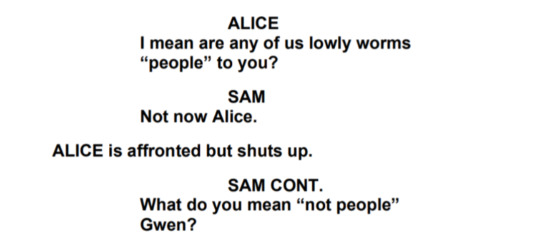
After being shut down time and time again, Sam is so eager for confirmation that there is more to all of this than meets the eye. And then Gwen says the B-word, and Sam loses it.
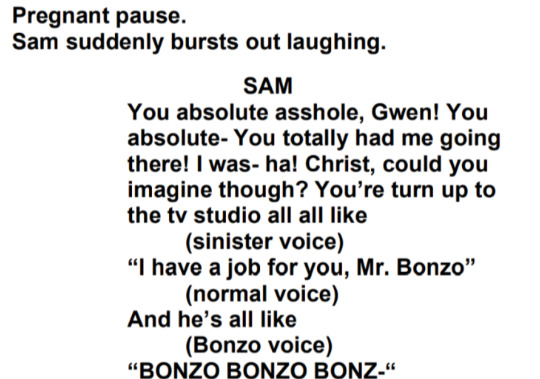
Sam is laughing here, but honestly? I think he’s angry, and his reaction is one of complete disbelief that Gwen would set him up like this just to, in his mind, take the piss out of him. He thinks that, at best, Gwen is having a breakdown and he’s once again being shut out or, at worst, Gwen is making a joke at his expense. Now, he’s used to being the butt of a joke thanks to being friends with Alice, but despite that we’ve never heard him call her an asshole the way he does Gwen. Temperamental and petty, turning around his hurt and anger over being stonewalled again and again to lash out at Gwen with his joke.
And honestly, can you blame him? (I can’t.)
Of course this wasn’t the ideal reaction. I have been waiting for Sam and Gwen to have a serious heart-to-heart about what’s going on forever, and Sam pretty much blew that chance without even realizing it. And I would be surprised if we get an apology out of him anytime soon, not only because this interaction is likely to push Gwen away from wanting to even be around Sam, but also because he’s not going to believe that Gwen wasn’t making fun of him or that Gwen isn’t having a delusional breakdown until he sees Mr. Bonzo with his own two eyes.
I also think this conversation would have gone very differently had Celia been there instead of Alice. Sam’s slew of psychological testing suggests he’s willing to follow the leader, and in this case he doesn’t seem immune to Alice’s general dismissiveness of Gwen. He may have even been primed to lash out at Gwen in this moment because Alice is constantly ragging on her; chameleon-like, he’ll take on the shade of the strongest personality when he’s on uncertain or dangerous footing. It’s almost a guarantee that Celia would have taken Gwen seriously, not only because she’s likely from or connected to the TMA-verse of horrors, but also because it was Celia who received the first Mr. Bonzo case. And had Celia been there to temper the disbelief, Sam would have absolutely been ready to hear Gwen out in full. I honestly cannot wait for Celia to be back in office; she’s going to walk in to these new, rancid office vibes like Troy from Community walking into the whole room on fire while casually carrying the pizza.
So, what do I think this means for the rest of the season? Well, the title of this episode seems telling: Solo Work. Gwen and Sam’s respective desires for their experiences to be validated and their goals to be taken seriously paired with the seeming dismissiveness of those around them are going to push them along their separate paths, dangerously alone. And I suspect that it is only going to be Celia or, more likely, an encounter with Bonzo, that is going to put them back on the same path—if it happens at all. Good luck, babes!
#The Magnus Protocol#tmagp#tmagp theory#tmagp spoilers#The Magnus Protocol spoilers#tmagp ep 18#tmagp solo work#samama khalid#Sam Khalid#gwen bouchard#the magnus institute#character analysis#sam khalid character analysis#Teal's TMAGP takes
476 notes
·
View notes
Text
Transmutations in TMAGP
Since most of the incidents deal with change and transformation, I'd like to collect my thoughts on their nature in one post. So I'll be explaining some ideas on the alchemical processes taking place. First I'll explain a (relatively) simple Tria Prima model, and then I'll try to break down some processes and symbolism we see in the show. This will be really long, like excessively long. Look, I'll throw in some nice alchemy pictures to make it more palatable. Feel free to skip the Tria Prima part if you've been reading my previous theories, I'm not really covering anything new in that.
Transmutations broken down with the Tria Prima
I think the most simple way to view it would be with the Tria Prima. Many of you are probably aware of the Body/Mind/Soul division, and while it's extremely simplistic, it actually works for us here.

From Alchymia complementum (1630)
We have the Body, or the Salt 🜔, which is the core, the physical shell, the metaphorical earth that the change is inflicted upon. In an alchemical transmutation, Salt must first be separated from the volatile components by burning or decomposition, and in the end they are brought back together. In TMAGP, Salt would be the physical, grounded part, such as a human body, a Bonzo suit or a creepy toy. You can think of it as a vessel.
Then we have the Mind, or the Mercury ☿. This is trickier to break down because the alchemists saw it as so many different things, but you can think of it as the essence. Not just the essence of the subject, but of everything. It's the malleable and volatile part of the subject, but it's also the intangible thoughts, concepts and archetypes in the collective unconscious, the metaphorical water or air that flows through everything. It's both the prima materia and the dissolving principle. In TMAGP, this would be the the changing ideas and beliefs around a concept, most recently demonstrated in how Henrich Unheimlich came to be, but you can see it in a lot of the cases. It's why all the supernatural phenomena reflect not only fears but also expectations and other strong feelings. Why the lack of clocks and purpose creates timeless liminal spaces, why the fear and reverence given to Bonzo made him what he is. It's what the Archivist uses as a fuel for its human transmutations and what the Magnus Institute tried to tap into for their Magnum Opus.
And finally we have the Soul, or the Sulphur 🜍, which seems to confuse people the most because of what we usually think of as the "soul". It's not the entirety of a human psyche, just the active, conscious and feeling part. But it's also the soul of all matter, in that it gives them life and allows active change. It's the metaphorical fire. Alchemists thought that Sulphur can be used to coagulate Mercury, to give it form. In TMAGP, Sulphur would be the catalyst that initiates the transmutation. It can be literal fire (like what possibly created Heinrich Unheimlich), or just a metaphorical fire, such as the violent act that gave birth to Bonzo.
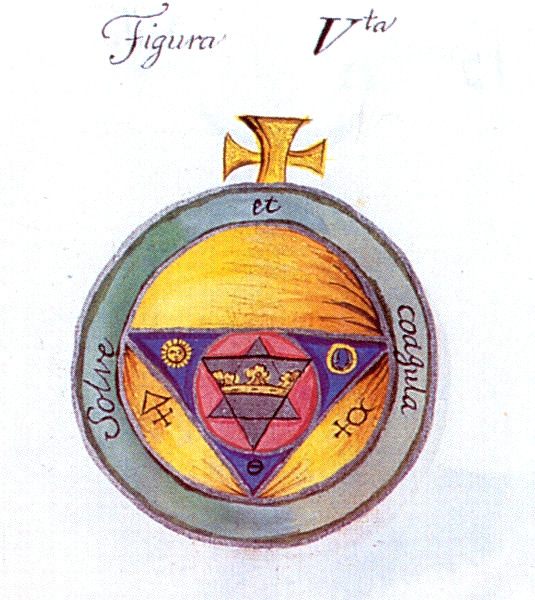
From Hermaphroditic Child
There are also clearly two types of transmutations in the show. First we have the active ones, caused by fire or intent. Then we have the passive ones, caused by slow dissolution and characterised by coldness. These mirror the active (Celestial Nitre or Sol) and passive (Celestial Salt or Luna) principles of alchemy. It also evokes solve et coagula, where all matter is constantly dissolved and coagulated. As alluded to before, Mercury is what dissolves and Sulphur is what coagulates, and their purified counterparts in Luna and Sol form a harmonious unity when brought together. Which brings them back to their Salt.
A lot of the cases can be broken down into Salt/Mecury/Sulphur, but it's not an entirely clean model because many of the transmutations go wrong or are incomplete. Next I'll try to break down the actual processes based on some common symbolism and what we're given in the show.
Transmutation stages and common symbolism
For this I'll assume the most basic version of the Great Work, which consists of three stages: nigredo, albedo and rubedo. There are loads of different stages and processes, but they generally fall under these three. The cases in TMAGP rarely involve the entire process, and some are clearer than others.
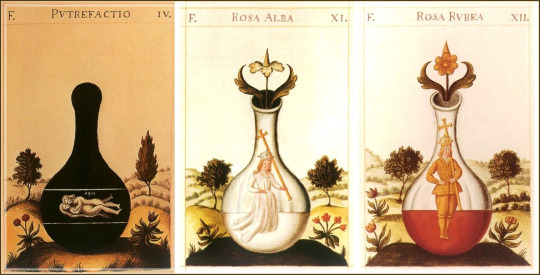
From Pretiosissimum Donum Dei (1475)
Sealed vessels
First of all, I've noticed that a lot of these transmutations take place in a sealed vessel of some kind, much like they do in alchemy. This can be anything from a Bonzo suit to a closed Victorian carriage, a coffin, a locked room (such as a prison cell, a lock museum, a room in a reptile emporium, a virtually made zoom call room, the Archivist's office), a closed off liminal space (like a secret garden with no exit, a pier enveloped in fog, a brutalist building trapped in a void), or even a human body (like in Alice's dream, like alnewman's thigh, or like Herr Schmidt's brain).
Nigredo (blackening)
The stage where matter is broken down, burned or decomposed. Transformation can only occur once the old has been reduced to ashes so that something new can be born from it. Spiritually it involves ego death, stripping down the conscious thought and dissolving into the unconscious. Common symbolism/imagery include death, corpses, skeletons, dismemberment, rot, toads (ie. the decomposing prima materia), crows, ravens, Saturn/lead, darkness/night, indistinguishable black mass (massa confusa), flooding, drowning (especially of the king), eclipse, the green lion (=mercury) swallowing the sun.

From Philosophia Reformata (1622), coloured by Adam McLean
Here are some examples I've found in TMAGP:
Calcination or decomposing matter with heat (either open fire or a more subdued, natural heat). While there are cases with proper fire, heat seems to be the important factor here. In her dream, Alice describes the unbearable heat that envelops her when she's stuck inside her heart. We also get the exterminator at the reptile shop complaining about the heat when she's stuck in the room with an infection (=decomposing flesh), Lady Mowbray's caterer is cooking with high heat when his experience begins, Magnus mentions the unreasonably warm weather when he encounters the carriage, Menke was "sweating buckets" in the Bonzo suit, Mrs. Locke keeps forgetting to get someone to turn the heater off, and so on. Heat is what begins the transmutation process in these cases.
Dissolution into the mercurial waters. This is usually what drowning signifies in the alchemical imagery, and also what I think it signifies in TMAGP. Especially the drowning of the old king, which we're straight up given in the lock museum. Bonus points to the pest control lady who was about to be drowned in snakes, an extremely common symbol for Mercury. We also have the tech review guy speaking about the screen dissolving, and one of the transcripts has an instance of the Archivist dissolving into the wind. (No one can convince me that these word choices are coincidental.) And then we get some dissolving egos. The guy with his cursed dice seems to be losing his identity and starts seeing himself only as an archetype of a stranger who tricks people into rolling the dice, and poor Kyla's ego was dissolved into the emergent mind of Liverpool. We also have several cases of people who get lost in liminal spaces (such as the pier or the service station, even the custodian at Hilltop) and then get their identities dissolved. I don't think it's a coincidence that this happens at liminal locations, which are very aligned with the concept of Mercury. Especially if there's an element of water present. These themes are also usually accompanied by mentions of coldness, which tracks with Mercury's properties being wet and cold.

From Splendor solis, coloured by Adam McLean
Descending or entering a dark space, both of which align with the idea of descending into the collective unconscious or the "dark night of the soul". The darkness is pretty straight-forward. It's the violinist getting lost in the dark woods, Doctor Webber entering the dark garden, Patricia repeatedly talking about being in a dark space/world with her baby. The descent is more incidental, but I'm keeping an eye out for patterns. For example, the old couple had to descend to enter the lock museum, the food critic descended the alleyway to Hungry Man's Grill, a lot of descending into basements. It's a recurring theme but could be meaningless.
Infections or putrefaction, or the literal decomposition of living matter. We've got our fair share on the account of this being a horror podcast, but this should be seen as a transitory stage in a transformation. Some good examples include Dr. Webber's body breaking down and decomposing to give way to his new plant self, or Alesis's body becoming paralysed and moldy to allow the coral to grow. Magnus's colleague being ingested in the carriage, Bonzo's victims putrefying inside the suit, Alice/Sam's rotting corpse in her dream, the rotting food in Hungry Man's Grill (this one seems interesting, because the restaurant seems to be stuck in the putrefaction stage and the food refuses to decompose even when the guy leaves).
Sunset as a manifestation of the green lion devouring the sun (gold dissolving into mercury), which symbolises the onset of ego death or the beginning of the blackening (or the night). This has been emphasised in two cases. Firstly, the crypto bro from ep. 13 looks at the sun setting behind the sea (=Mercury) twice when making decisions on the trading app, and secondly, Lady Mowbray's hunt begins when the sunset colours everything crimson. Both of which are pivotal moments for these characters' personal transformation.

From the Rosarium Philosophorum
Albedo (whitening)
This stage marks the purification of matter through repeated washing, distillation and the like. It's where we begin to see the true essence of the prima materia and will be able to separate it from the rest. This stage is often associated with Luna, silver, or the White Elixir/Tincture. In psychology, it's where you discover and reconcile with your Shadow (or Animus/Anima) in the unconscious. Common symbolism includes doves, swans, lilies, whiteness, vibrant colours and eyes (known as the peacock's tail stage, though it's technically the transitional stage between nigredo and albedo), water of life, bathing, dawn (as in "always darkest before"), light emerging from the darkness, the queen, the moon (Luna), Anima (in the Jungian sense).

From the Mellon Collection
Some examples in TMAGP:
Purification or washing as an intentional attempt at removing impurities. Daria making adjustments to her painting in an attempt to perfect her own body. The violinist washing his hungry violin with blood in order to purify the music it produces. Alesis attempting to rid herself of her own impurities by growing a new self out of a coral (a lot of water and moonlight in that one, which fortifies the connection for me). Since purification is also often attributed to mercurial water, a lot of the water symbolism fits here too.
Colours, as seen in Daria's vibrant tattoo. Also the colours rushing into the liminal service station and the odd colours seen in the fog surrounding the pier. It's fitting, but not a very prevalent theme. Unless you count all ink, in which case it's very prevalent.
Encountering one's Shadow, which is a big theme in both TMA and here. Coming to terms with your inner darkness, fears and desires is what purification is about in spiritual alchemy. I think this is what the Archivist is doing. It's an embodiment of the Shadow, covered in eyes, here to distill and purify your fear and then project it back to you (killing you in the process). Although it's up to debate whether it feeds on the purified, distilled fear or the impurities left behind, it does leave something to be coagulated into the physical manifestation. (It's also worth noting that the compulsion has a lot of water imagery attached to it in the transcripts, things like "the dam breaks", "words gush out", "pouring out of her unstoppably like a river". And just to be extra clear, rain, dew, seas and rivers are all common symbols for Mercury.) Other than that, there are plenty of doubles or reflections in the show. We've got Darrien and his alternate darker self, the Millenium Dome construction worker's clone, Herr Schmidt's actual Anima crying to be let out of his brain, the horror blogger seeing his traumatic memories projected onto the big screen, Dr. Webber encountering his late wife in the garden, Alesis meeting her Piece in a dream, the list goes on. The important part for purification is the acceptance or healthy integration of the Shadow, which usually takes a twisted turn in TMAGP.
Dreams are often attributed to Luna, and they function as a link to the subconscious. In TMAGP, many of the dreams are linked to an epiphany, though it's not always a purifying one. Especially on the TMA side. Though I think the tech reviewer's meditation in the locked room could be seen as a form of purification. I think dreams and meditation have a wider metaphysical effect that I won't go into here.
The queen or the mother would go more into discussions on characters than processes, but I'll mention it here anyway since the albedo stage is most often equated with Luna and the emergence of the queen. We've got a couple of mothers, most notably Patricia (probably not Rupey's real mother but anyway) who's feeding her baby with her own blood (this is often symbolised by a pelican which were believed to bite their own chests to feed their young). Alesis is also very nurturing, and her entire case screams lunar symbolism. And the most obvious queen would be Lady Mowbray, who's described as a matriarch. But the most interesting one of all is our very own Celia, who fits the lunar archetypes of motherhood, secrets and deception to a T.
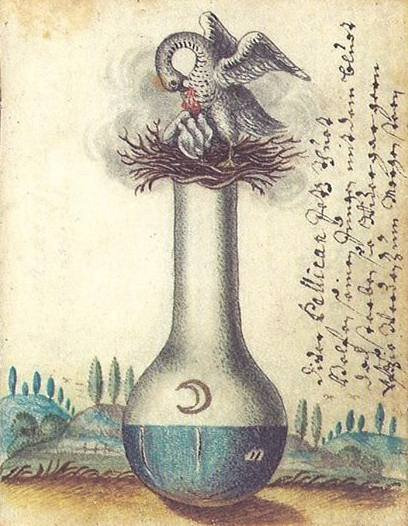
From the Ulrich Ruosch Manuscript
Light in the dark is pretty straightforward. Patricia describes Rupey as bringing light to her dark world, in the Hilltop custodian's memories there's a sudden light coming from one of the shops in the dark shopping centre, the computer monitor sheds light into the dark zoom room, the ritual Sam witnessed radiates yellow light into the dark. (Though the yellow makes it more in line with the citrinitas or yellowing stage, which is specifically the solar light shining through instead of the lunar reflection. It's a frequently forgotten stage with little direct symbolism so I thought it would make more sense to omit it, but just know that depictions of sunrise or yellow light might lean towards the citrinitas stage between albedo and rubedo.)
Rubedo (reddening)
The final stage marks the completion of the Work and the emergence of the Philosopher's Stone. It includes the conjunction of the opposites and the coagulation of the ultima materia. In psychology, it involves the integration of the unconscious and the ego into a singular self. Common symbolism for the reddening includes a phoenix, the king, a crown, the sun (Sol), gold, red or purple dye, red roses or poppies, blood, trees (specifically the Philosopher's tree) and lions. The union of the opposites (Sulphur and Mercury, silver and gold, Animus and Anima etc.) is symbolised by a marriage of the king and queen, sun and moon, red and white flower, two lions fighting, a lion (sun) devouring a serpent (moon), procreation, and so on.
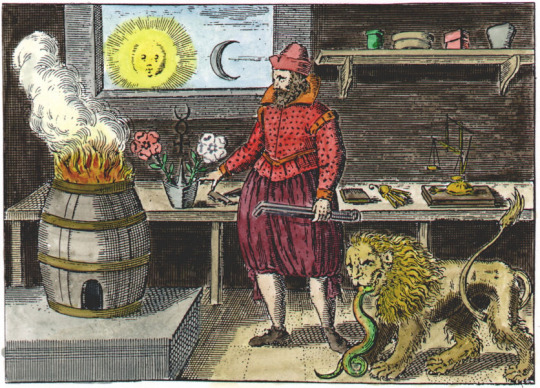
From The Twelve Keys of Basil Valentine
Examples in TMAGP:
The union of opposites is a continuation of encountering one's Shadow, and sometimes this part is counted into albedo (or citrinitas) as well. But the conjunction can only happen once you've separated and purified the components, or made peace with them. Dr. Webber is unified with his late wife (queen) in the garden, and the two are coagulated into one tree. In Alice's dream, she's also unified with her late husband (king) into the same body, though the process is incomplete and has to begin again (probably because she's not able to perform the separation, which is thematically fitting and painful for my soul). The conjunction is also present in the union of Sulphur and Mercury (or their purified versions Sol and Luna), which I discussed in the Tria Prima section. And I currently think it's also what Fr3-d1 or the entity inhabiting it is trying to do with the data it's collecting.
Blood and dye, which are symbolic of the liquids that give the Stone its crimson color. Lots of blood to go around, but the most relevant case would once again be the violin and the blood that purifies it. Purple dye reminds me of one case alone, and it's notable that the more purple paint there was on Bonzo's cards, the more present he became. It's not entirely clear to me when Bonzo actualised into what he is now, so it's difficult to say whether that was intentional. Though the episode was written by Alex, which means I'm much more willing to read intentional alchemy symbolism into it.
Devouring is big in alchemical iconography, and it's big in TMAGP too. We've got masses of people biting into each other (the violinist's audience and the hungry non-people in the service station), obviously Bonzo eating people (and letters), Lady Mowbray's cannibal party, little German kid eating a mum sandwich, demon baby eating his "mum" just cause (bringing us back to purification with blood), and Hungry Man's Grill which we can't prove isn't serving human meat. Either way, it's often used as a metaphor for the conjunction.
Trees have also only popped up twice (as far as I recall), but in compelling cases. First is Dr. Webber, who by now has gone through all the stages. Second is Newton's Arbor Philosophorum, which is usually formed with Mercury or Silver. He feeds its fruit to his dog (another act of devouring and union), who begins to grow into a tree itself. Newton truly was on the precipice of something.

From the Twelve Keys of Basil Valentine
Conclusion
Whew, I'm never writing something like this again [bzzt]. If you read this far, wow. I'm impressed, and I appreciate you. Did the pictures help? Or make it worse? Let me know.
PS. I recognise that I might be drawing parallels where there are none, but that's what I do. I hope you got something out of it. Also do not ask me what's up with Needles. I have no idea what to make of him.
#written after tmagp40#i hope someone enjoyed this#overanalysing media#this is my life now#the magnus protocol#tmagp#tmagp spoilers#tmagp analysis#tmagp thoughts#tmagp theory#alchemy#symbolism#tria prima theory#tmagp salt#tmagp sulphur#tmagp mercury#tmagp luna#tmagp sol
79 notes
·
View notes
Text
TMAGP Episode 33 Thoughts

Acquisition Risk? Huh?
Nostalgia is one hell of a drug! And so is wanting a date to go well, to be picturesque (or so I’ve heard—I’m aro and don’t date). This case overall is kinda middle-of-the-road for me. It’s too vague to be super visceral, and not consequential enough to be spooky. That said, I did like the dynamic the characters had. The flirtiness (and Victoria’s subsequent awkward explaining of those moments) fading away as the situation got dangerous. And Victoria’s “Glad to be in it with someone” contrasts so well with the moment when James tries to keep the date on track, when she realizes she’s lost him to whatever is going on at the pier.
Wellings pops up again, too. Aside from being probably super dead (thanks Sam), he was also the guy looking into specific constellations in a previous episode.
My favorite part of this one was the VISCERAL FUCKING DENIAL. No wonder Chester’s reading it to Celia. He should show it to Gwen, too.
Other stuff:
AH! An American! I think Gwen’s definitely suspicious of them for some reason (she seems far too interested in specifically Starkwall in episode X, for instance). Other than the obvious “this guy seems really fucking dangerous.” Otherwise, Gwen semi-tactfully fishing for information is giving me LIFE. I’m just patiently waiting for her to get desperate enough ask for help 🤭.
2 notes
·
View notes
Text
i adore how tmagp really leans into the idea that you are the horror. you're what's wrong here. you're listening. you're not supposed to be listening. you were transferred into this universe along with the fears.
you are a voyeur, and you do not belong here.
3K notes
·
View notes
Text
I know I haven't mentioned it in a while but I'm still red-stringing about the symbolism of tea vs coffee btw. Alice found a tape recorder and now Sam’s bringing her tea. She's been introduced to the Archives' universe. She's upset and goes to make herself coffee instead. She refuses to be drawn in and finds refuge in the comforting and familiar instead.
#i want to add a tea/coffee column to my spreadsheet...#the magnus protocol#tmagp spoilers#original post#my magnus protocol stuff#16 anti-social#magnus protocol speculation/analysis#alice dyer#queue cause i'll be at work when the episode airs#500 notes!#jeeze theres one every week now#1000 notes!
1K notes
·
View notes
Text
(minor TMA spoilers and general TMAGP spoilers) Having so much time to think about incidents in TMAGP due to hiatus made me realize that all of them, to some degree, contain the theme of "sealing your own fate" or "consequences of greed/hubris".
You see, while I do not believe that TMA had a consistent theme every statement was based on, the overall messege seemed to be that horrors are inevitable. Once you've been marked you cannot escape, no amount of therapy or running can release you from it. I think Michael Crew is the best example of that:
"The thing that chased me, you see, it was an arcing branch of the Twisting Deceit, taken shape to follow me. (...) And I knew within that book was something that could not only release me from my pursuer, but chain my being to that rush of wind and vertigo forever." Michael Crew in "The Coming Storm"
You cannot escape it once you've been marked, only bind yourself to different one and this marking is, most often than not, nonconsensual. Jane Prentiss would run around and infect random people, Not!Them didn't need anybody to come to them before it was sealed and Peter Lukas also tended to just disappear random people just to feed. The fears were very predatorial and active and the victims were selected based on their own fears and anxieties. This is not to say there weren't victims who failed due to their own curiosity/hubris/greed, but I think it's telling that few of the most greedy/curious people in the series, Mikaele Salesa and Jurgen Leitner, stayed largely uncorrupted by the fears not cause they avoided interacting with them, but simply avoided getting marked by them.
Now we come to protocol and every incident so far has the main subject of that incident actively engage with the horror and have one or multiple points at which they could stop and leave, but they do not. Daria went to the tattoo shop on her own accord, Harriet wanted her husband back no matter what and even Dr Webber was described to be able to leave the garden whenever he wanted, but, due to hiding from authorities, chose to stay until it was too late for him. Every incident so far seems to have this theme of consent, characters detailing very clearly that consent was given to engage with the abnormality:
"Ah well that’s a tricky one. Sort of? In many ways he stabbed himself on me. By the time he saw the needles we were already very close. Close enough to smell his sweat and cheap aftershave. In fact, he barely had time to be afraid before we embraced. He’s terrified now of course…" Needles in "Introductions"
"The young man's interview was not exceptional as he had no experience in charity work, no driving license nor any demonstrable experience in retail. He claimed however, to know the Hilltop Centre better than anyone and as he was the only applicant in the role I elected to give him a try." Dianne Margolis in "Give and Take"
"I hesitated a moment but before I could consider her strangeness a particularly high tide of color swept down the corridor toward me. I panicked, and before I realized what I was doing I had darted inside the lift and slammed the close-door button." Terrance Stevens in "Running on Empty"
It does not matter some of these are under duress or deception, all of them contain some type of action "confirming" consent. Mind you I do not believe all the victims of of these horrors confirm consent in some way, like people who get killed by Bonzo probably didn't agree to it (though considering he's most likely a hitman, some degree of "you agreed to this by overstepping your boundaries" philosophy could be applied), but subjects of the incident very much pay for consequences of their own actions.
That brings us to OIRA itself, and how every character so far seems to actively dig themselves deeper by their own accord, Gwen wants position of power, Colin wants to figure out the system, Sam wants to know why he wasn't chosen and Alice is in it for the money (for her brother which still counts as consent). This is literally said directly to us in episode 1:
"If you hate working here so completely, you are perfectly within your rights to resign. No one is forcing you to stay here." Lena to Gwen in "First Shift"
All of this, all this horror is happening due to their own accord, curiosity, obligation, greed for knowledge or just for the money, it does not matter, the choice is there, but they delve deeper anyway. We will see how long it holds up, but I will be on the look out for this theme in the future.
#the magnus protocol#the magnus archives#tmagp spoilers#tmagp#tma#magnus pod#alice dyer#samama khalid#colin becher#tmagp theory#tmagp analysis#lena kelley#gwen bouchard#michael crew
273 notes
·
View notes
Text
yeah so tmagp 23 was about women having children to "save themselves" and become better in the eyes of society, after they have been rejected by society (in this case, relationship break down with husband). then the pressure that they put on said child to actually save them, after the terrifying process of birth, in which others provide hollow praise for undertaking it (liking but not commenting). Their child is to be the better version of themself and the mistakes that they had made. Their child will have their eyes but borrow nothing else. Of course the child turns out "wrong". Of course they turn out to be a "monster" in the eyes of the mother (and by extension, the mother's community - the community on the blogging website.)
#tmagp#the magnus protocol#tmagp 23#actually weirdly obsessed with this episode#was fucking terrifying but it sure was good#tmagp analysis
108 notes
·
View notes
Text
I loved the ambiguous ending of the Magnus Archives, but I think if they were going to take that ambiguity, this was the BEST way to do it.
We aren’t simply getting Jon and Martin back — no.
This is a situation where we don’t just get them back, alive and well, rather we are forced to watch — because we can only ever watch — as characters we’ve come to understand so deeply, are stripped away of any semblance are form, in a state between death and life, and an agonising state at that. The buildup in this case to the pure existential dread of these semi-aware people, assuming the case was about the JMJ trio, has genuinely made it one of my favourite cases.
They’re still ambiguous, just not in the same way, and it’s so chilling.
And Jon has certainly not lost the tragedy of dying a mystery, because that’s what he is now: a mystery to be investigated by our new cast. If anything it’s worse that he’s being investigated now, because that’s the exact thing he wanted to avoid in episode 39 of TMA.
#the magnus protocol#tmagp#tmagp spoilers#tmagp 22#TMA#the magnus archives#tma analysis#tma spoilers#<- mentions both so#jonathan sims#martin blackwood#jonah magnus#me talking as though I’m still not shaking and losing my mind currently
728 notes
·
View notes